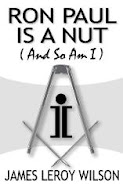I just read a small e-book by Wallace Wattles about Jesus(.pdf). Wattles was a writer in the New Thought movement of a century ago, and though forgotten for a time, some of his self-help work has found a home on the Internet today. I expected this work to dwell less on the orthodox claims about who Jesus was, and more on his connection to God/Spirit. Of that, I was right. But I was surprised, however, by Wattles' quite radical interpretation of Jesus' message.
Wattles' most striking point is that we've been taught to view Jesus based on the book of Isaiah, written 700 years before Jesus was born ("he was despised and rejected," etc.), and not on the Gospels themselves. Wattles makes a persuasive case of something I've suspected for a while: that Jesus wasn't really humble and lowly, but rather a well-to-do and very influential rabbi; his message being all the more revolutionary by the prestige of the person giving it. Jesus really was an infidel and traitor, and this is a compliment; Wattles quotes Wendell Phillips: "Write upon my grave. infidel-traitor; infidel to every church that compromises with wrong; traitor to every government that oppresses the poor."
The Roman Empire, Wattles wrote, was a "great taxing machine." The only way men of property in Palestine could pay their high taxes was by exploiting the poor: "It is an economic axiom which is indisputable that all taxation of whatever kind, upon whomsoever levied, is wrung at last from the hard hands of the toiling poor; that is the reason they are poor." The "taxpayer" may sign the check, but with his diminished wealth he has less to buy, less to save and invest. There is less economic activity, which causes unemployment, which in turn drives down wage rates. So even when the poor don't pay the money, they pay in other ways.
Jesus, Wattles said, came for the poor, and thereby posed a threat to the religious and political authorities and their vested interests. No one is worthless, no one is expendable. Wattles calls for a "Christian socialism" in which man "may use and acquire all that he holds for his own development; but he may not own that which makes him master of another man." Wattles held that "real socialism" would actually extend private property to more people.
There is a lot of merit to this point of view. The root cause of the exploitive tax structure is the root cause of all exploitation: monopolies. If we're not paying taxes to the State, we're paying rent to the "private" landowner, who profits not by producing anything but by mere ownership, who (often) acquired the property through the State, and is protected by the State's force.
I don't think Wattles' solution that "highways, railroads, natural resources, and the great machines will be owned and operated by organized society" is practicable or desirable. I still believe that resources are still most efficiently (and justly) allocated through prices rather than "democratic" control. But I do believe that extracting rent and royalties from monopolizers of land and resources, and returning the revenue to the people through (minimal) governmental services and dividends, is the best possible check against exploitation.
That doesn't rule out other means. If we don't shift taxes to those who monopolize the means of production, the least we can do is cut taxes and regulations that inhibit economic activity and prevent the poor from attaining a better life.
In any case, Wattles' book may be unorthodox, but there is a lot of valuable insight.
James Leroy Wilson's one-man magazine.
Subscribe to:
Post Comments (Atom)




This is an interesting proposition that Jesus was wealthy and influential. There are many instances in the gospels where people call him rabbi. About six months ago I read something else of interest. Jesus was given a great amount of gold and other valuables after his birth from the magi from the east. What ever happened to it? Did it disappear? Or did his family keep it to be used later? He set up no small accommodations in the upper room for his last passover. If we could view the past as it happened, I'm sure we'd all be shocked.
ReplyDelete